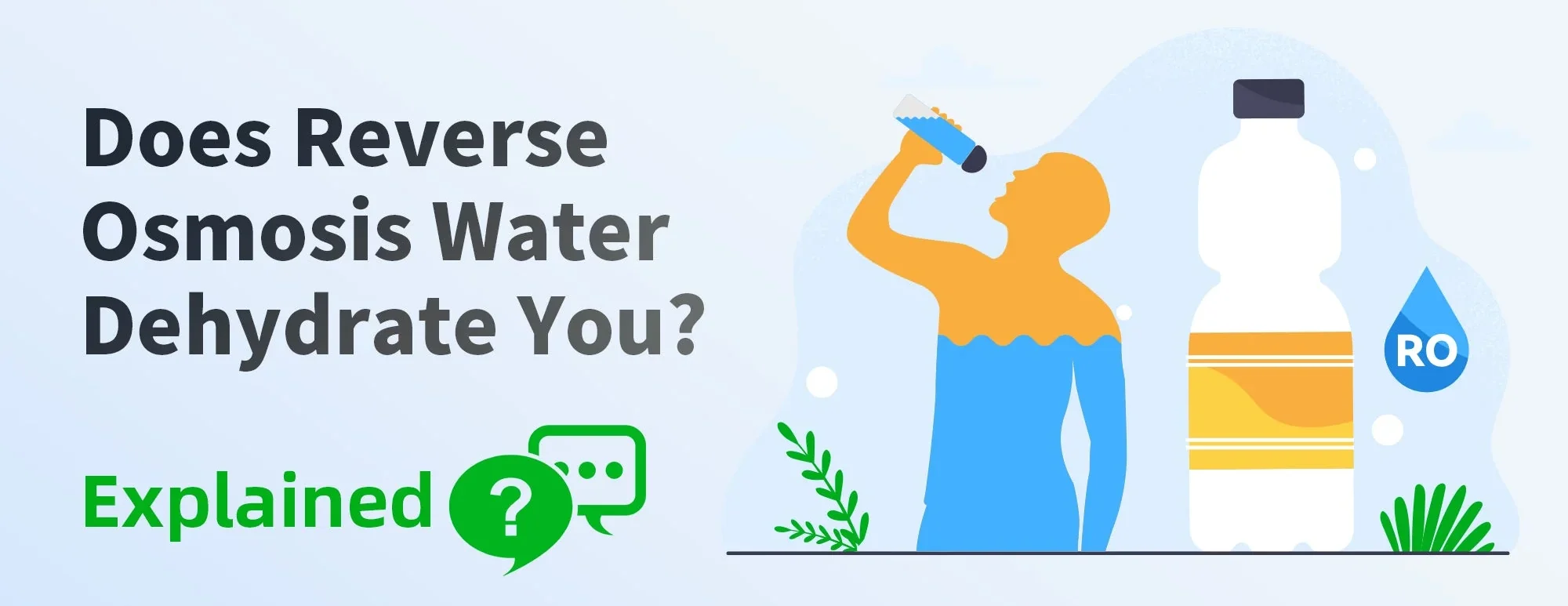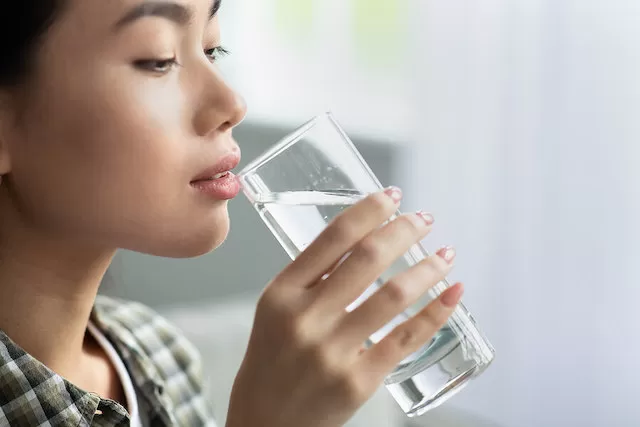The phrase “why does pure water dehydrate you” circulates widely online. Yet scientific evidence shows that pure water hydrates the human body the same way as mineral water. The confusion arises from three overlapping issues: electrolyte balance, overhydration, and long-term use of demineralized water. To understand this claim properly, it is necessary to explore hydration physiology, medical evidence, and expert guidelines.

What Is Pure Water?
Pure water is water free of dissolved minerals, salts, and impurities. It can be produced by:
-
Distillation: boiling water and condensing steam.
-
Reverse osmosis (RO): forcing water through semipermeable membranes.
-
Deionization: passing water through ion-exchange resins.
Key Characteristics of Pure Water
-
Contains negligible calcium, magnesium, sodium, or potassium.
-
Tastes flat due to lack of dissolved solids.
-
Safe to drink in moderation.
-
Lacks additional nutritional contribution compared to natural mineral water.
Hydration and Human Physiology
Hydration occurs when fluid enters and distributes across body compartments.
-
Intracellular fluid: two-thirds of total body water.
-
Extracellular fluid: one-third, including plasma and interstitial fluid.
-
Osmotic balance: maintained by sodium, potassium, chloride, and bicarbonate.
The kidneys regulate excretion through urine concentration. Antidiuretic hormone (vasopressin) controls water retention. Hydration depends on both volume intake and electrolyte balance, not on whether water is mineralized.
Why the Myth Exists
The claim that pure water dehydrates you originates from multiple misinterpretations:
-
Overhydration and Hyponatremia: Excessive water dilutes sodium levels.
-
Electrolyte Loss Replacement: Water alone cannot replace sodium lost in sweat or illness.
-
Public Health Guidance: WHO advises remineralization of desalinated water for long-term safety.
Each point addresses special conditions, not everyday hydration with pure water.
Overhydration and Hyponatremia
Hyponatremia occurs when sodium concentration in blood falls below 135 mmol/L. Causes include:
-
Drinking water faster than kidneys can excrete.
-
Consuming only water after long endurance exercise.
-
Administering large volumes of hypotonic fluids in hospital settings.
Symptoms of Hyponatremia
-
Headache and nausea.
-
Muscle weakness and confusion.
-
Seizures in severe cases.
In these scenarios, water is not causing dehydration. Instead, water dilutes sodium. Pure water hydrates but does not maintain electrolyte balance if taken in extreme excess.
Electrolyte Imbalance During Heavy Loss
Sweating removes water and sodium. Average sweat sodium concentration: 20–80 mmol/L.
Diarrhea or vomiting also removes electrolytes. Drinking only pure water in such cases restores volume but fails to replace sodium or potassium.
Why This Matters
-
Cells swell when plasma becomes hypotonic.
-
Muscle cramps and dizziness develop.
-
Oral rehydration solutions (ORS) provide sodium, potassium, and glucose for balanced absorption.
Pure water does not worsen dehydration. It simply does not solve electrolyte deficit.
Long Term Consumption of Demineralized Water
World Health Organization research on desalinated water supplies highlights concerns with very low-mineral water.
Key Findings
-
Chronic use of low-mineral water may reduce calcium and magnesium intake.
-
Fluoride absence may affect dental health.
-
Infants fed formula with distilled water developed hyponatremia in rare case reports.
WHO recommends remineralizing public desalinated water to maintain nutritional quality. This addresses public safety rather than acute hydration.
Safety of Drinking Distilled or RO Water
Distilled and reverse osmosis water are safe for daily consumption. Most health authorities confirm that they hydrate equally as tap or mineral water.
Potential Drawbacks
-
Flat taste due to lack of minerals.
-
No dietary mineral contribution.
-
Exclusive long-term use without dietary balance may reduce mineral intake.
Misconceptions
-
Pure water does not “leach” minerals from the body.
-
Kidneys regulate sodium, calcium, and potassium independently of water purity.
-
Hydration efficiency is not reduced by lack of minerals in water.
Hydration Guidelines for Everyday Life
Daily Needs
-
Women: ~2.7 liters total water (including food).
-
Men: ~3.7 liters total water (including food).
-
Athletes or those in hot climates may need more.
Practical Tips
-
Monitor urine color: pale yellow indicates good hydration.
-
Use electrolyte drinks during prolonged exercise.
-
Rely on diet for minerals if drinking mostly pure water.
-
Avoid excessive intake beyond thirst cues.
Pure Water vs. Mineral Water
| Feature | Pure Water (Distilled/RO) | Mineral Water (Natural/Spring) |
|---|---|---|
| Electrolyte Content | Negligible | Contains sodium, calcium, magnesium |
| Taste | Flat, neutral | Distinct, varies by source |
| Hydration Function | Effective | Effective |
| Nutritional Value | None | Contributes dietary minerals |
| Safety | Safe in moderation | Safe, with added mineral benefits |
| Long-Term Use | Requires dietary minerals | Supplements mineral intake |
Practical Scenarios
-
Office Worker: Drinks RO water daily with balanced meals. Hydration remains normal.
-
Marathon Runner: Drinks only water during 4-hour run. Risk of hyponatremia without sodium replacement.
-
Infant Feeding: Formula prepared with distilled water exclusively. Higher risk of electrolyte imbalance.
-
Military Training: Soldiers drink excess plain water in hot climates. Cases of overhydration reported.
Signs You Need More Than Just Pure Water
-
Prolonged exercise over one hour.
-
Heavy sweating in hot climates.
-
Illness involving diarrhea or vomiting.
-
Symptoms of dizziness, cramps, or nausea after drinking plain water.
Best Practices for Hydration Safety
-
Ensure water intake matches thirst and activity.
-
Ensure electrolyte replacement in endurance activities.
-
Ensure dietary intake of minerals when consuming distilled water.
-
Ensure avoidance of extreme overconsumption.
FAQs
Does pure water dehydrate the body?
No. Pure water hydrates cells the same way as mineral water. Dehydration occurs from fluid loss, not water purity.
Why do people say pure water dehydrates you?
The myth arises from confusion about hyponatremia, electrolyte loss, and WHO reports on low-mineral water.
Can drinking only distilled water cause health problems?
Yes, but only if consumed exclusively for long periods without adequate dietary minerals. Short-term use is safe.
Is pure water less hydrating than sports drinks?
In everyday life, no. During endurance exercise, sports drinks provide needed sodium and potassium.
Can pure water leach minerals from the body?
No. Kidneys regulate mineral balance. Pure water does not remove stored minerals.
Is reverse osmosis water good for hydration?
Yes. RO water hydrates effectively. It may taste flat but functions like any drinking water.
How much pure water can kidneys process per hour?
Healthy kidneys excrete 0.8–1.0 liters per hour. Intake beyond this risks dilution of sodium.
Should infants consume distilled water in formula?
Medical experts advise using mineral-containing water to prevent electrolyte imbalance in infants.
What does WHO recommend about pure water?
WHO advises remineralization of public desalinated supplies for long-term safety, not because of dehydration.
What is the safest way to hydrate with pure water?
Drink according to thirst, supplement with electrolytes during heavy losses, and maintain a balanced diet.
Learn More: Cheating Will Fail DMV: Complete Guide to Rules, Penalties, and Legal Risks
Detailed Guide to HCOOCH CH₂ H₂O: Hydrolysis, Properties, and Applications
Conclusion
Pure water does not dehydrate the human body. Distilled, reverse osmosis, and deionized water hydrate effectively. Misinterpretations about hyponatremia, electrolyte replacement, and WHO safety recommendations created the myth. Evidence from medical institutions and public health authorities confirms that hydration depends on fluid balance and electrolytes, not mineral content alone. Drinking pure water is safe, but awareness of context ensures optimal health.

